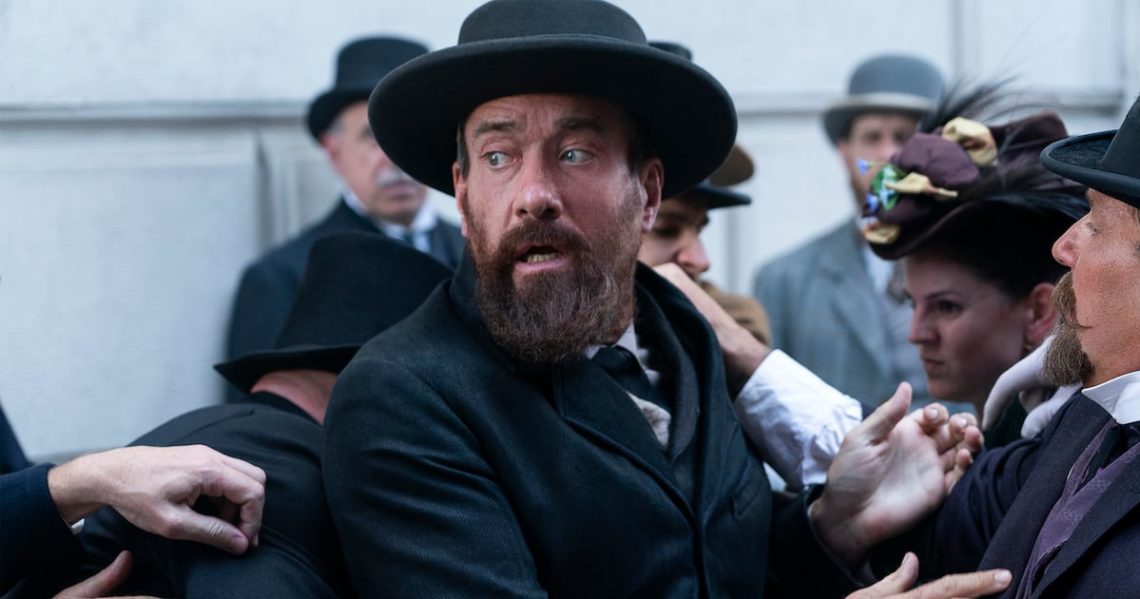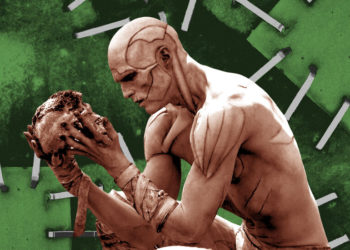Four U.S. presidents have been killed by an assassin, and it’s arguable that the least famous of them is James Garfield, the 20th man to assume commander-in-chief duties. Thus, Death by Lightning is, first and foremost, a compelling attempt to restore his legacy (and memory) as an honorable progressive cut down before he could affect the change he promised.
Yet in its portrait of a madman justifying his unrepentant greed and criminality by claiming that he was embracing (and embodying) American values, it’s also a sneakily timely tale that boasts echoes of our present domestic madness. With big, brash performances from an all-star cast led by Matthew Macfadyen and Michael Shannon, it’s a four-part historical drama (premiering Nov. 6 on Netflix) which suggests that today’s rot has its roots in yesterday’s tragedies.
Adapted from Candice Millard’s 2011 book Destiny of the Republic: A Tale of Madness, Medicine and the Murder of a President by Mike Makowsky (Bad Education, I Think We’re Alone Now), Death by Lightning is a two-track story about individuals on a collision course in a post-Civil War country struggling to regain its footing.
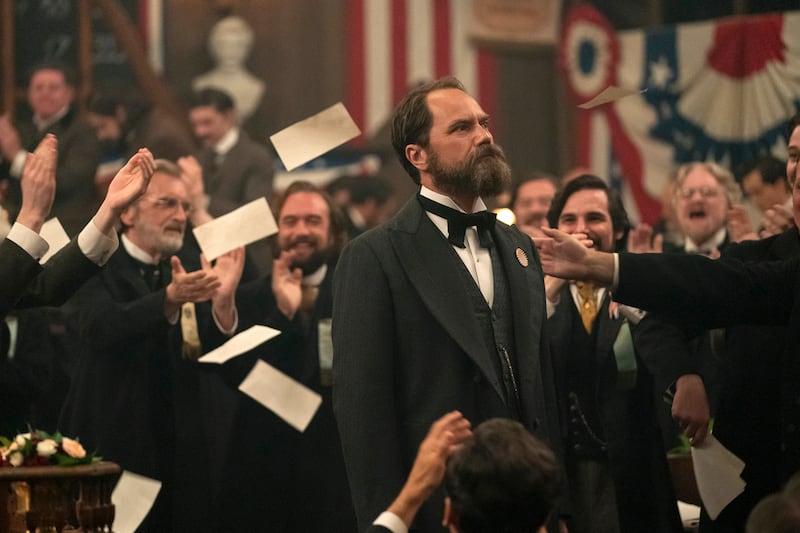
A veteran of the war, Garfield (Shannon) is, in 1880, a congressman who’s relocated to his farm in Mentor, Ohio with his wife Lucretia (Betty Gilpin) and their children. A stout, bearded head of the household consumed with building a picnic table that even he admits will likely be ugly, Garfield radiates virtue and valor.
When he receives a letter asking him to attend the upcoming Republican National Convention to help nominate John Sherman (Alistair Petrie), he reluctantly agrees, convinced that opposing two-time president Ulysses S. Grant—and the New York City fat cats who control him and the entire system—is a worthy cause.
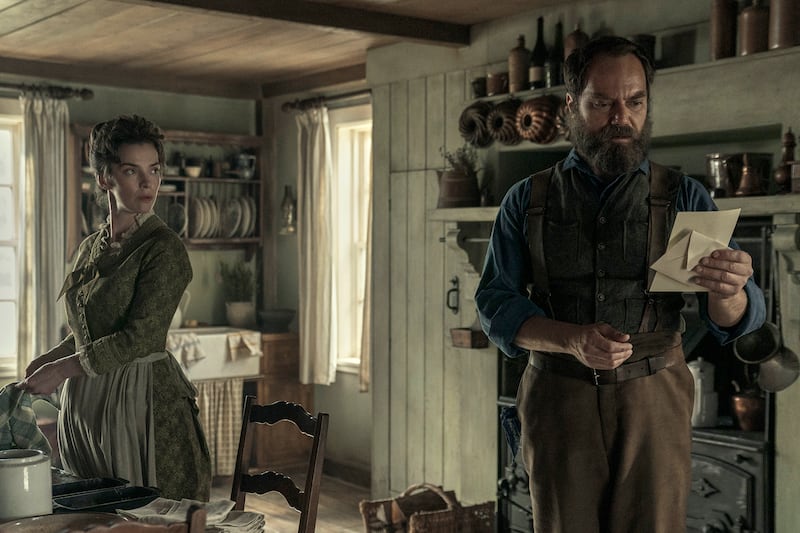
As Garfield prepares to throw his weight behind Sherman, Charles Guiteau (Macfadyen) persuades a parole board to release him from New York City’s Tombs prison, where he’s been incarcerated due to the latest of his many shady misdeeds. Despite his French name, Guiteau is American through and through, and as he tells everyone, he’s an avowed patriot, certain that his efforts to improve his lot in life are in keeping with his homeland’s promise of opportunity.
Guiteau wants to be another of America’s self-made men, and his supportive sister Franny (Paula Malcomson) strives to aid him in his quest, allowing him to stay in her home as he sets about establishing a new newspaper, The Daily Theocrat, that will give voice to the common man. Franny’s husband George (Ben Miles), however, sees Guiteau for the crook that he is, and his suspicions are validated when the ex-con steals everything he can and hits the road.
From his first appearance, Macfadyen’s Guiteau is a confident, conniving fast-talker whose every word sounds like a lie, and he brings a wild-card energy to Death by Lightning that coexists seamlessly with its statelier political action at the Convention. There, Garfield gives a speech in Sherman’s favor that’s so rousing, it unexpectedly inspires the party’s delegates—who are deadlocked over selecting a candidate—to swing their votes to him, no matter that he doesn’t seek the nomination.
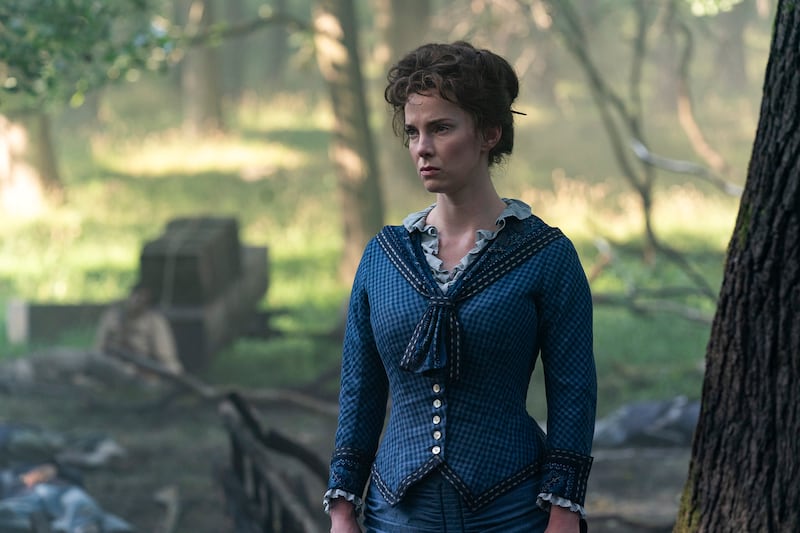
This upsets Sherman, albeit not as much as it rankles power-player Roscoe Conkling (Shea Whigham), who with his right-hand thug Chester Arthur (Nick Offerman) by his side, wields unmatched authority thanks to his sway over the New York Customs House port, whose collector directs the flow of 75 percent of all federal revenue. A Grant backer, Conkling is furious at this turn of events, and even angrier when his rival James Blaine (Bradley Whitfield) influences the party to choose not him as Garfield’s running mate, but Arthur, a bullying attack dog whose prime interests are alcohol and sausages.
Directed by Matt Ross, Death by Lightning has a low-lit, wood-burnished look that recalls Lincoln, and if it tends to tell rather than show (especially with Garfield), its action is swift and boisterous, in large part courtesy of its stars, whose turns are one notch below larger-than-life.
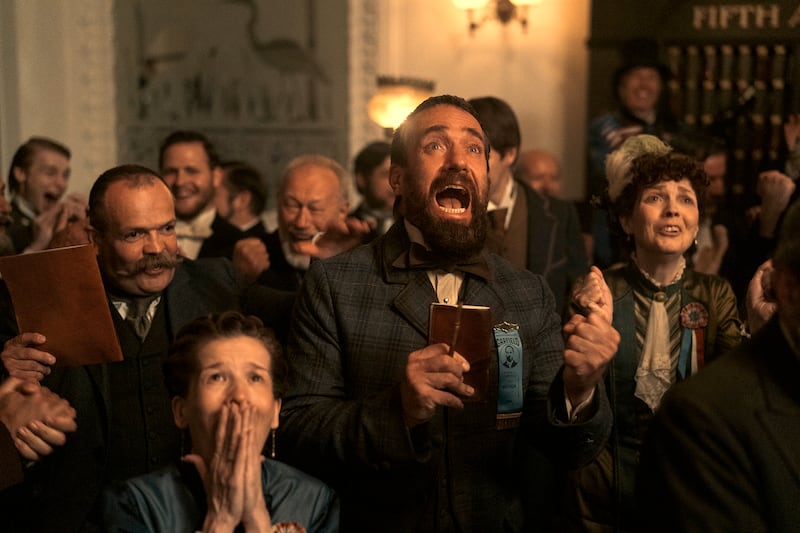
That’s most true with Offerman’s Arthur, a burly buffoon prone to yelling, crying, and getting comically sloshed, as well as with Whigham’s Conkling, whom the actor plays as a shameless schemer and tyrant. That duo’s scenery-chewing provides balance with Macfadyen’s showmanship, and blends nicely with Shannon’s dignified Garfield, who upon winning the general election sets about enacting progressive policies in keeping with his upstanding old-school reputation.
Intent on making the government work for the people, Garfield begins holding “calling hours” to meet with his constituents, and it’s during these sessions that Guiteau—who’s already, on multiple occasions, tried to ingratiate himself with Garfield, Lucretia, and even Arthur, including by giving rally speeches in Garfield’s favor—seeks to secure a place in the administration, possibly as an ambassador to France.
Of course, Guiteau has no business being anywhere near the corridors of power, and in Death by Lightning, everyone treats him as a nuisance to be humored and dismissed, thereby setting the stage for his fateful decision, on July 2, 1881, to shoot Garfield, merely three months into his presidency, at Washington, D.C.’s Baltimore and Potomac Railroad Station. The series posits Guiteau’s motivations as a bonkers stew of ambition, resentment, and delusion, and in Macfadyen’s deft hands, he comes across as a 19th-century ancestor of the confused, conspiracy-addled young online men who have made 2025 so dangerous.
Nonetheless, Makowsky never draws one-to-one parallels, sticking closely to the public record and allowing such connections—as well as those born from Garfield’s fight against governmental corruption and fraud—to manifest naturally.
Even at a concise four episodes, Death by Lightning might have made for an even more compact and propulsive feature film. Even with a little excess baggage, however, it’s an engaging dramatization about a relatively forgotten, if crucial, moment in the nation’s history—one that has quite a few lessons to impart about the dangers posed by graft and vice, mental health crises, fake news, and the bitter little men whose desires to be somebody, coupled with their resentment at their lousy fortunes, drive them to seek infamy through dastardly murder.
The post Netflix’s Presidential Assassination Drama ‘Death by Lightning’ Is Eerily Timely appeared first on The Daily Beast.
